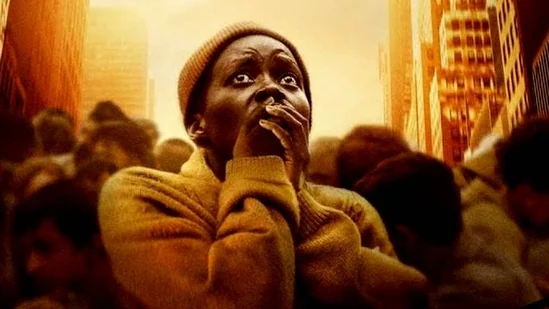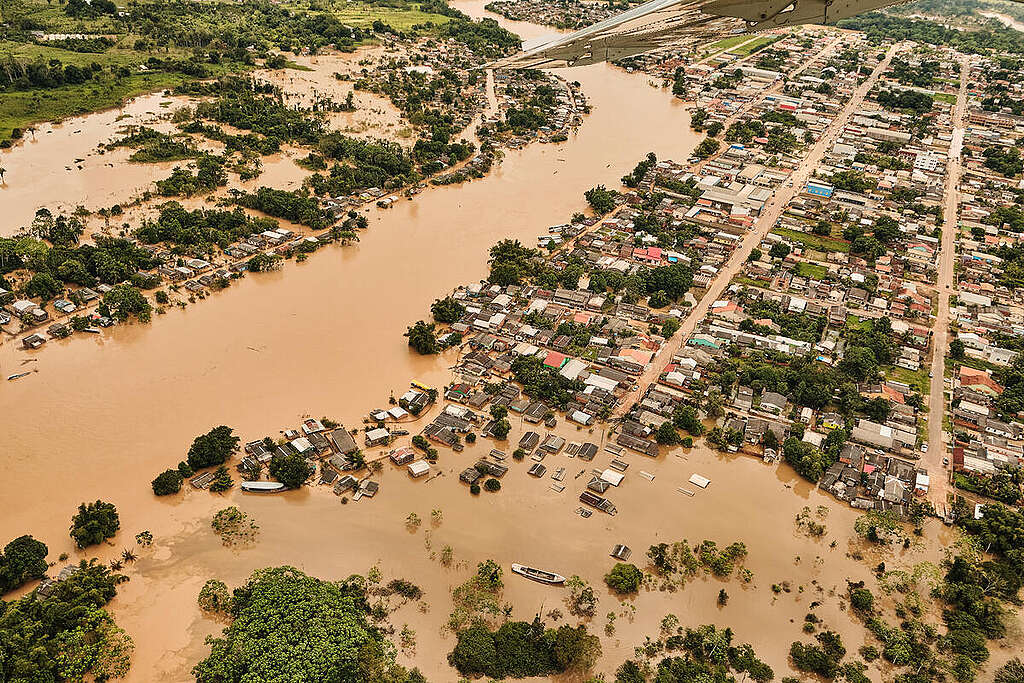I love horror movies, always have. As early as I can remember, I'd rented out Child's Play every other Friday, so it's safe to say that I've built up quite a tolerance to the frightening and fanciful. Not many horrors get a reaction from me these days, but, I am fanatical about the ones that do. A Quiet Place is one of those franchises that does not disappoint.
So, when one of my favourite movie franchises features one of my favourite actresses (the unmeasurably talented Lupita Nyong'o, think Jordan Peele's Us) trying to get a slice of my favourite pizza during an alien invasion in New York City, I knew I was in for quite the treat.

What I didn't expect was that this Friday night outing would become a reminder of my vulnerability as a person living with a comorbidity during a crisis – and as a Greenpeace activist, more specifically, the climate crisis.
Spoiler Alert: Nyong'o plays a terminally ill person who wants nothing more than a slice of Patsy's pizza in East Harlem while aliens with an audio hypersensitivity prey on frightened New Yorkers. (Spoiler: there will be more spoilers to come!)
Diabetes and climate change
I've lived with diabetes almost as much of my life as I haven't, and yet, until now, I haven't really asked what my special needs are in relation to this global meltdown that is the climate crisis. A quick online search (and I try my best to avoid Dr Google) and a plethora of new research pops up on the matter.
One that I've been aware of since the series of heat waves last year: people with diabetes are likely to feel heat more. I researched this in preparation for our summer in South Africa. It turns out that certain diabetes complications, such as damage to blood vessels and nerves, can affect your sweat glands so your body can't cool as effectively. When my partner and I go to the gym and do the same exact workout, he is often drenched in sweat, while I look like I've finished a leisurely stroll.
3/ As always, the most disenfranchised people are suffering the worst consequences of the climate crisis. During extreme heat events vulnerable populations like unhoused, differently abled, elderly, and poor people are most vulnerable. #ClimateEmergency https://t.co/RPSDuHECjR
— Greenpeace USA (@greenpeaceusa) July 18, 2022
But that's the least of my worries, I guess… More than 58% of viral, bacterial, and fungal infections have been found to be worsened by climate change. Diabetics are at higher risk of severe infections and hospitalisation for bacterial and viral diseases partly due to compromised immune responses. I'm already out of medical savings for this year because of how expensive my insulin is, heaven forbid I need urgent care.
Caught in the storm
I hear it a lot (and unfairly) that diabetics only need to get their health under control, and that it's more of a "lifestyle disease". The fact that it is fast becoming the leading cause of death in my country (and in others too) should tell you that it has far less to do with my food choices than the environmental factors driving this health crisis. It is this rhetoric that distracts us from the real interventions needed to ensure that we are all protected from climate impacts.
For instance, should a major extreme weather event hit Johannesburg and I am left homeless or without electricity (which is highly likely, given the fragility of our energy grid) where do I keep my insulin, which becomes ineffective after 14 days at room temperature? Will I scramble around the city for drugs like Nyong'o in A Quiet Place: Day One?
What if we have water disruptions due to said extreme weather? The fact that people living with diabetes are prone to dehydration, which causes spikes in blood glucose levels, which then make us prone to infections and complications, means that we require a little more consideration… and far less gaslighting.
Breaking the silence
We do not all have the same needs; climate solutions are not one-size-fits-all. People with disabilities, of instance, are two to four times more likely to die or be injured in climate emergencies. But, those most vulnerable are often left out of conversations about climate impacts and solutions thereof.
It's hard enough steering the climate conversation as a person of colour, let alone a person who is physically impaired. It is even harder trying to deal with a comorbidity, nevermind trying to get everyone else to empathise. I may be a fan of horror movies, but I definitely do not want to live one out. So, we start looking for solutions today.
It's time to make the polluters pay. Sign now to hold the oil and gas corporations accountable, and support a safe and fair future for all.
I don't know much about the science or even the economics; but I do know about injustice. I know for sure that those who are responsible for the climate crisis need to pay for its damages. This is not a burden that me and anyone like me needs to take on for themselves, and that decision-makers must make polluters pay for the climate havoc they've caused.
Protecting the most vulnerable means investing in a robust and equitably accessible health system, but it also means taking into account the fragilities that are multiplied tenfold in times of climate crisis. It is therefore clear once again that making polluters pay must be a priority in terms of health policy. Maybe then we'd stand a better chance than Nyong'o?







